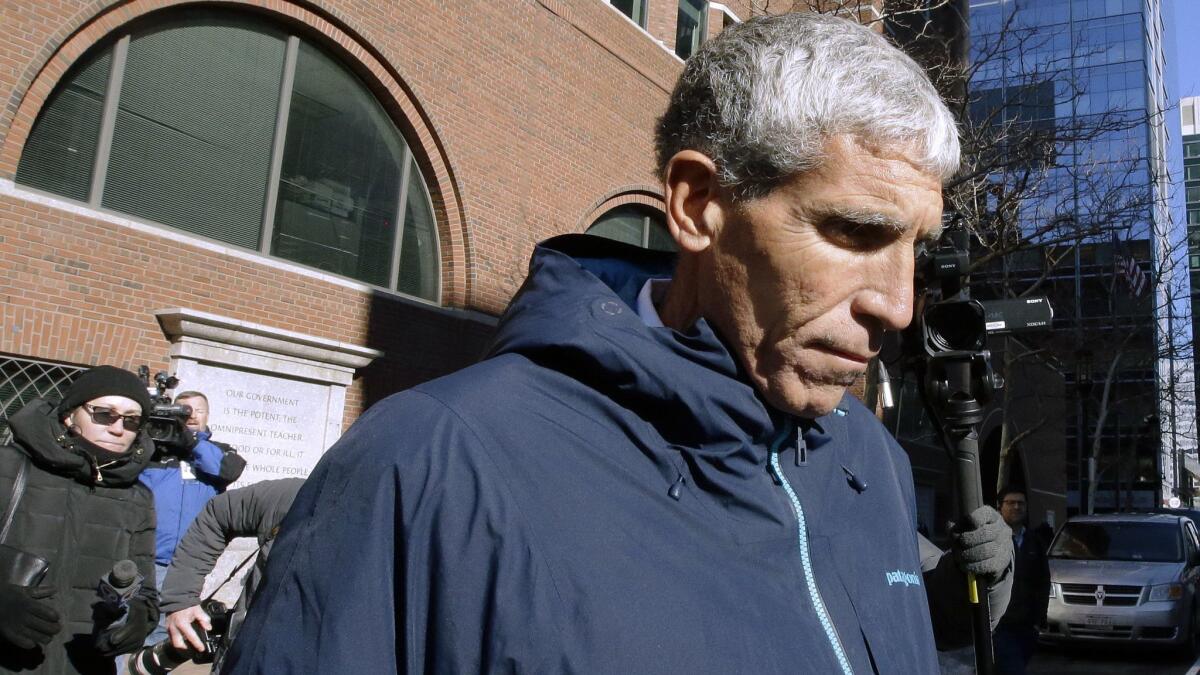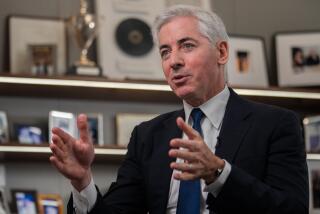Rick Singer, the mastermind behind the college admissions scandal, knew whom to target: the wealthy

The wealthy couple willing to pay him millions lived in Beijing, but William “Rick” Singer needed only to go to Pasadena to find them.
Michael Wu, a financial advisor for banking behemoth Morgan Stanley, worked on the seventh floor of an office building in the city outside Los Angeles. Wu specialized in Chinese clients and spent his days helping to invest their fortunes. When a Beijing pharmaceutical magnate and his wife wanted assistance getting their daughter admitted into a top-tier American university in late 2017, Wu turned to Singer for help.
Singer, who has since admitted to running the brazen college admissions scam that federal prosecutors brought down in March with criminal charges against dozens of people, was no stranger to Morgan Stanley or other big investment firms. For years he had been peddling his college admissions consulting services to wealth management advisors, who offered Singer up as a perk to clients desperate for help improving their children’s college prospects.
The Times reported last month that Zhao Tao, the chairman of a large Chinese drug company, and his wife paid Singer $6.5 million after he forged their daughter’s credentials to get her into Stanford University. It was a staggering sum even for Singer, who typically charged parents between $15,000 and $300,000 for his illicit services. No one in the Zhao family, nor Wu, has been charged with a crime in the case. Attorneys for Wu and the family have said Singer misled them into thinking the money would help fund scholarships and salaries at the prestigious school.
Wu’s role in connecting Singer to Zhao Tao offers a glimpse into the rarefied world of wealth management, in which advisors must find ways to distinguish themselves in a crowded field as they jostle to attract new clients and maintain the loyalty of the ones they already have.
Morgan Stanley and other wealth management firms were a natural hunting ground for Singer, who boasted to prospective clients that he worked only with the exceptionally wealthy.
“Okay, so, who we are — what we do is we help the wealthiest families in the U.S. get their kids into school,” Singer told one father, the co-chairman of an international law firm, on a telephone call recorded by FBI agents during their investigation.
According to internal emails reviewed by The Times, Singer ingratiated himself with Morgan Stanley advisors many years before federal investigators uncovered his admissions scheme, which involved rigging college entrance exams and bribing coaches to give up spots reserved for athletic recruits. Morgan Stanley advisors in and around Los Angeles invited clients to attend presentations Singer occasionally gave about his above-board consulting business, which included helping students prepare for exams and write application essays.
Singer was included on an official list of referrals Morgan Stanley maintained until 2015 but kept in contact with some advisors after he was removed from the list, according to a person familiar with Singer’s ties to the company. The decision to remove Singer as a referral was unrelated to the admissions scam he was running, the person said.
Elvin Turner, president of the Society of Financial Service Professionals and a 35-year veteran of the financial services industry, said wealth management advisors have to be vigilant when making referrals.
“A bad actor directly impacts your reputation. You have to be really careful and know the people you work with — I’m very, very careful with referrals,” he said.
It is not known how Singer met Wu. But Cynthia Newman, the manager of a group of Morgan Stanley offices that includes Pasadena, hired Singer to help her children apply to college, according to sources familiar with Newman. Newman, who did not respond to several requests for comment, has not been accused of any crimes.
Wu was fired for what a Morgan Stanley spokesperson described as his failure to cooperate with an internal investigation into Singer’s ties to the company. Wu’s attorney disputed this, saying in an email to The Times last month that Morgan Stanley terminated him while he was outside the country despite his best efforts to cooperate.
The Morgan Stanley spokeswoman declined to answer several questions The Times submitted about Wu, Singer and what the company found in its internal probe. Wu’s attorney did not answer questions about his client’s relationship with Singer, and Singer’s attorney declined to comment.
Yusi Zhao, the teenager Singer was hired to help, left Stanford after Singer’s operation was exposed.
Singer also had strong ties to the Summa Group, a Los Angeles branch of Oppenheimer and Co., another investment firm. For about 10 years, he gave presentations to Summa’s clients about applying to college, according to a person familiar with his relationship to the firm. He donated to Summa’s charity, the Banyan Foundation, and served on its board for 18 months.
Brian Werdesheim, Summa’s managing director, praised Singer in a promotional video last year, saying he brought “truly game-changing guidance” to families navigating the admissions process. Werdesheim referred questions to Oppenheimer.
Singer met one major client through an advisor at Summa: the father of Sherry Guo, whose family paid him $1.2 million to help get her into Yale.
Valerie Yang, a Summa advisor, was having tea with her mother at an upscale Los Angeles hotel when she struck up a conversation with Guo’s parents, who were sitting at a nearby table, said Joan Khoury, Oppenheimer’s chief marketing officer. Guo, whose family is from China, was attending a Catholic high school in San Juan Capistrano at the time.
Her parents asked Yang if she knew of a counselor who could help Guo apply to college, and Yang referred them to Singer as a courtesy, Khoury said.
The Guo family did not have money invested with Oppenheimer and was never a client of the firm, said Alexandra Gambale, an Oppenheimer spokeswoman.
“It was a social relationship,” Khoury said of Yang’s dealings with the family, one in which the advisor “provided translation services and made an introduction to the Key Worldwide Foundation at the request of the family.”
Yang referred questions to Oppenheimer.
Sherry Guo was admitted to Yale after Singer paid the women’s soccer coach $400,000 to misrepresent her as a recruited athlete. She has since been expelled. No one in the family has been charged with a crime, and an attorney for the Guos said the family believed the seven-figure payment, most of which went to a foundation controlled by Singer, was a legitimate donation.
Singer was removed from the Summa charity’s board when federal prosecutors unveiled their case in March and the firm learned of Singer’s crimes, the firm spokeswoman said.
Thirty-three parents have been charged in the case on suspicion of paying Singer either to have an expert test-taker boost their children’s entrance exam scores or to bribe coaches willing to sneak the teens in to school as recruited athletes. At least one of the accused parents found Singer through a wealth advisory firm, court documents suggest.
“We know people at Goldman Sachs who have, you know, recommended you highly,” Marci Palatella, chief executive of a liquor distribution company and wife of former NFL player Lou Palatella, told Singer in October 2018, during a phone call recorded by the FBI. A spokesman for Goldman Sachs declined to comment.
Marci Palatella is accused of paying Singer $75,000 to rig her son’s SAT score and another $400,000 to have him admitted to USC through its football program, which Singer allegedly arranged by paying off a school administrator to misrepresent Palatella’s son as a recruited long snapper. Palatella has pleaded not guilty to charges of fraud conspiracy and money laundering conspiracy.
Singer’s ties to the world of wealth management did not develop by chance. He is a prime example of the type of concierge service provider whom advisors increasingly offer as they court ultra-rich clients, several financial advisors and industry analysts said.
As the title implies, wealth management advisors such as Wu work in a realm typically reserved for the very affluent. They devise and carry out long-term financial plans for their clients to invest their money in various ways, make philanthropic donations, prepare for retirement and address other financial needs.
On its website, Morgan Stanley boasts having 15,000 financial advisors around the world who manage more than $2 trillion in clients’ assets — more than any other company.
Thom Taylor, who used to work as a financial advisor at Morgan Stanley and now runs his own firm, Del Rey Capital, said success as an advisor rests largely on how well an advisor gets to know a client and their financial goals. Those discussions often bleed over into areas that are not exclusively financial, such as estate planning, insurance and plans for children to attend college. It is common for advisors to refer clients to attorneys and other professionals to meet their needs.
Advisors sometimes also venture outside finance altogether in the effort to serve clients.
“Stock tips don’t really mean anything anymore,” Taylor said. “With the internet, everyone knows the same information at the same time about a company. So the question is, ‘How do I make myself indispensable?’ Increasingly, the answer is in providing access to other services that are outside the regular scope of investing…. If you have a client who is worried about getting a kid into college, it’s no small thing to be able to introduce them to someone who says they can help.”
Curtis Estes, a financial advisor for Northwestern Mutual, said he has helped clients improve their chances of getting their children into tony private schools on Los Angeles’ Westside by finding influential people to write letters of recommendation on their behalf. And he said he’s used contacts he has at a prominent hospital in the city to get patients in quickly to see doctors with long wait lists.
“If you’re smart, you want to add value any way you can, not just with your investments,” Estes said. “I am always looking for ways I can go above and beyond financial planning for a client. If all you’re able to offer is, ‘My stocks are better than someone else’s stocks,’ then you’re bound to disappoint.”
Such steps are necessary in a volatile industry in which investor loyalty is hard to maintain as investors pull their money from an advisor’s control on average after three years, Estes said.
“If you’re not providing good service, you’re not going to keep your clients,” he said.
Andy Saperstein, co-head of wealth management at Morgan Stanley, said as much in a promotional video featured on the company’s website. “Today, advisors are much more than simply financial advisors to their clients that only talk about investments,” he said. “They’re deeply integrated into their client’s lives.”
Unlike other advisors, Robert Amoruso, who founded a small investment advisory firm in Santa Monica, said he takes a strict approach to the job and steers clear of aspects of a client’s life not directly related to financial planning and investing.
“I think you really want to stay in your lane,” he said. “This is an example of how it can blow up in your face. The path to hell is paved with good intentions.”
More to Read
Start your day right
Sign up for Essential California for news, features and recommendations from the L.A. Times and beyond in your inbox six days a week.
You may occasionally receive promotional content from the Los Angeles Times.







